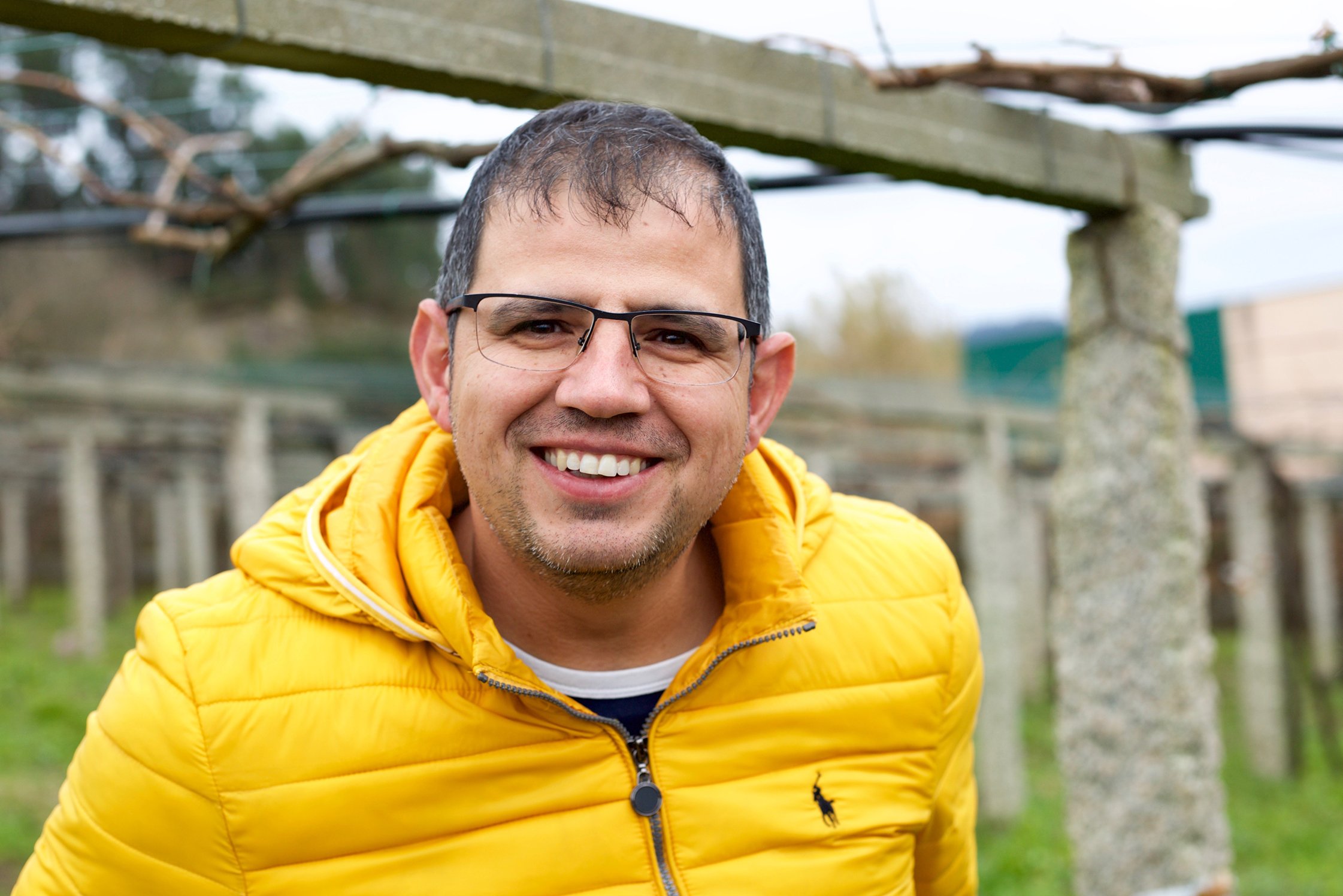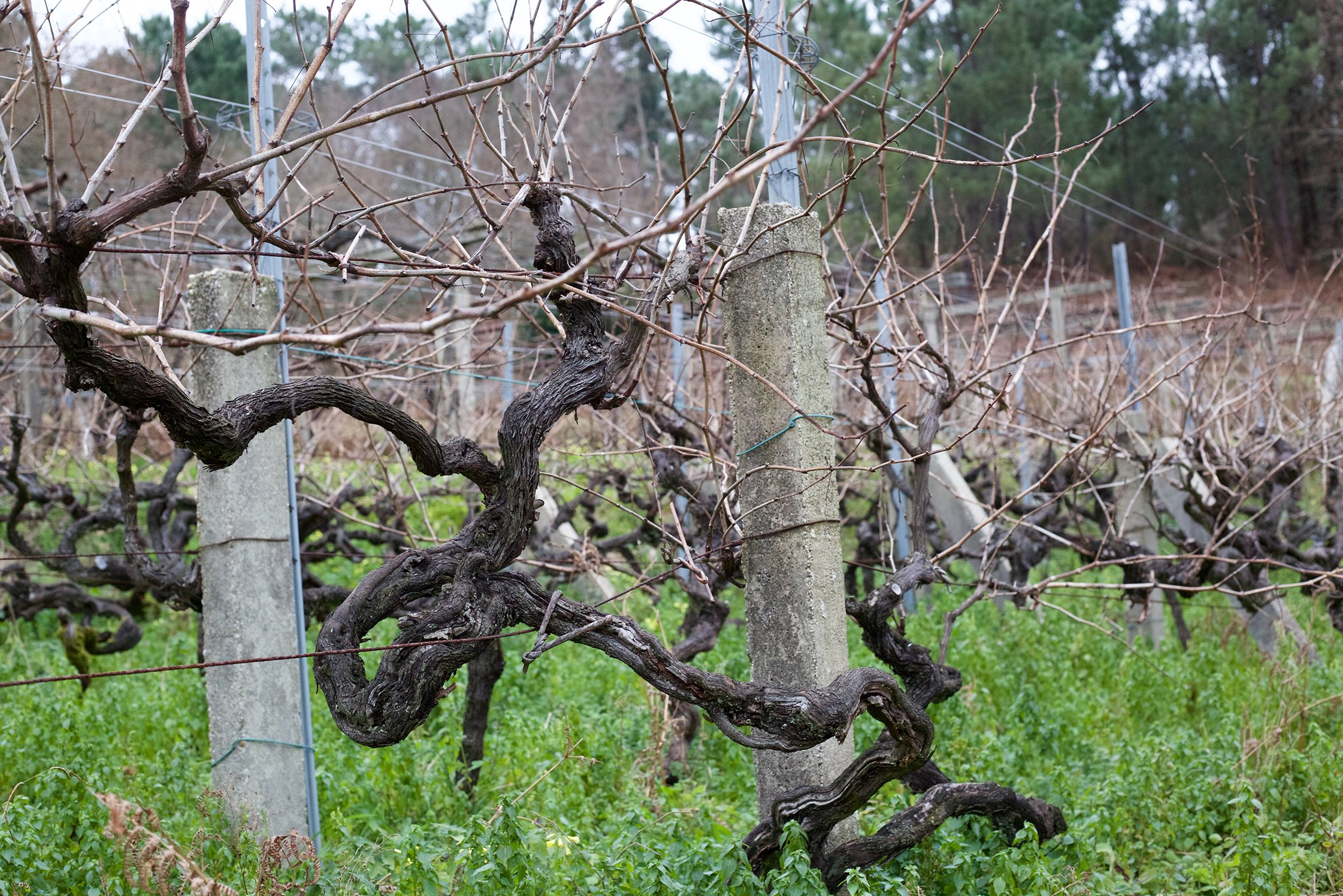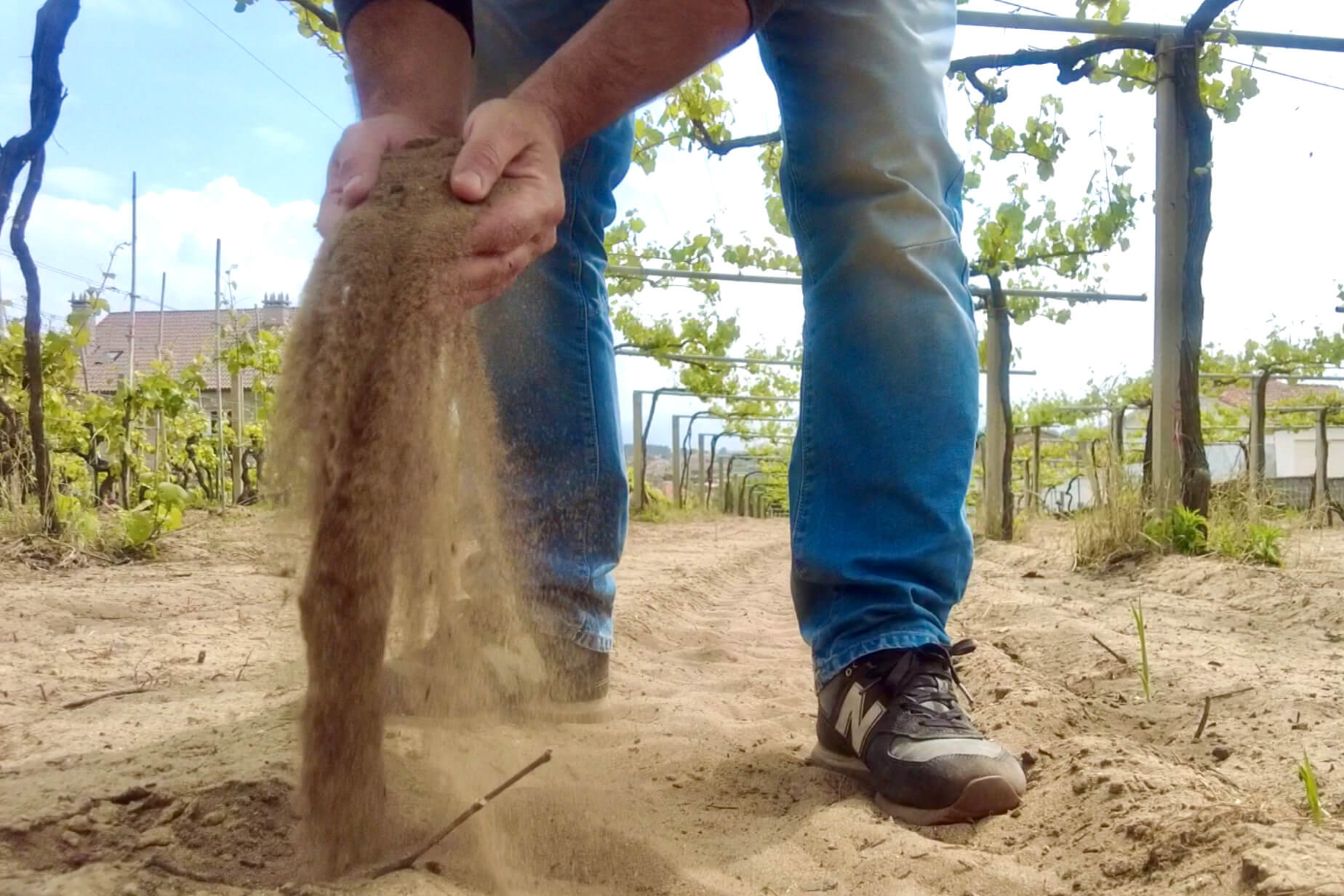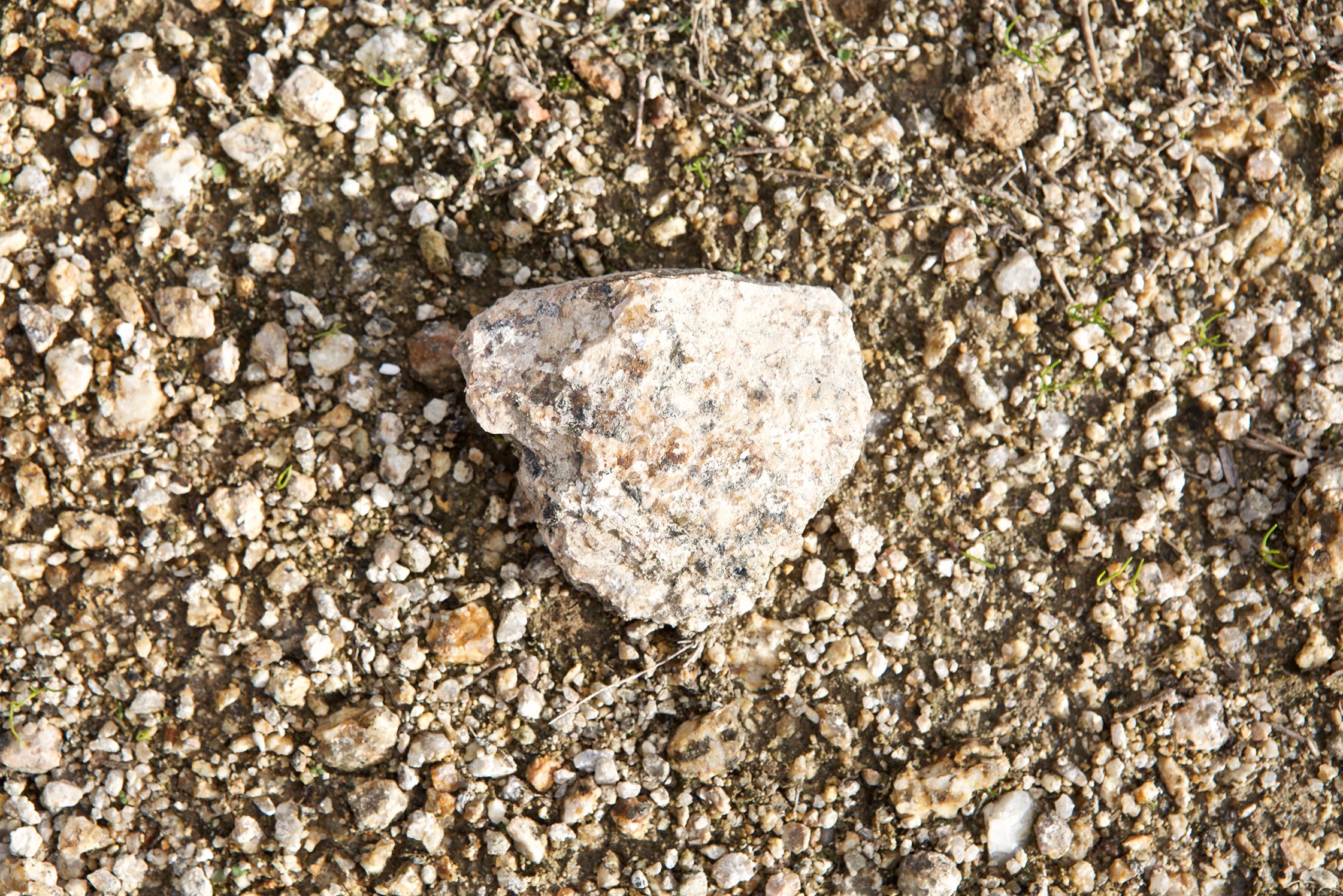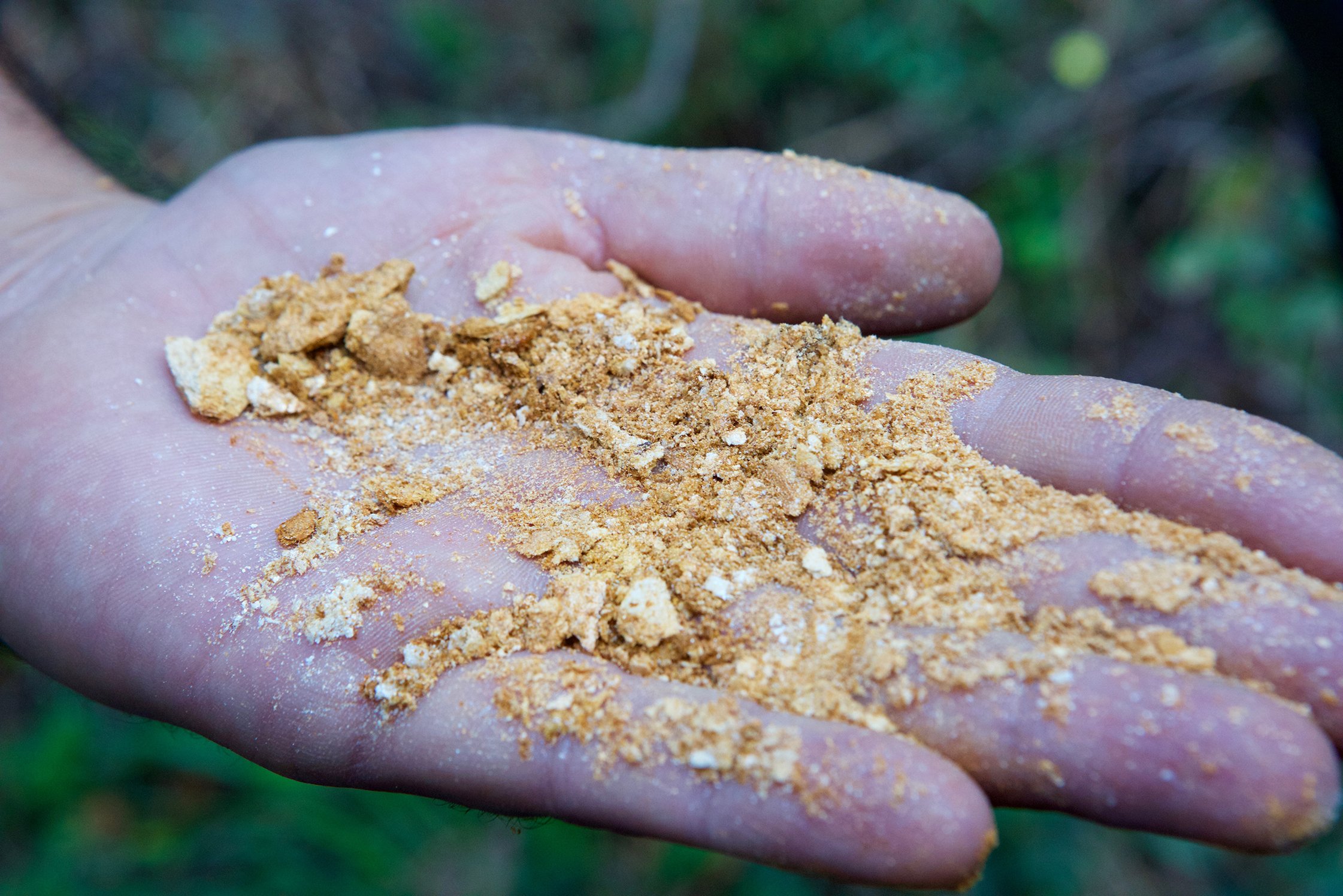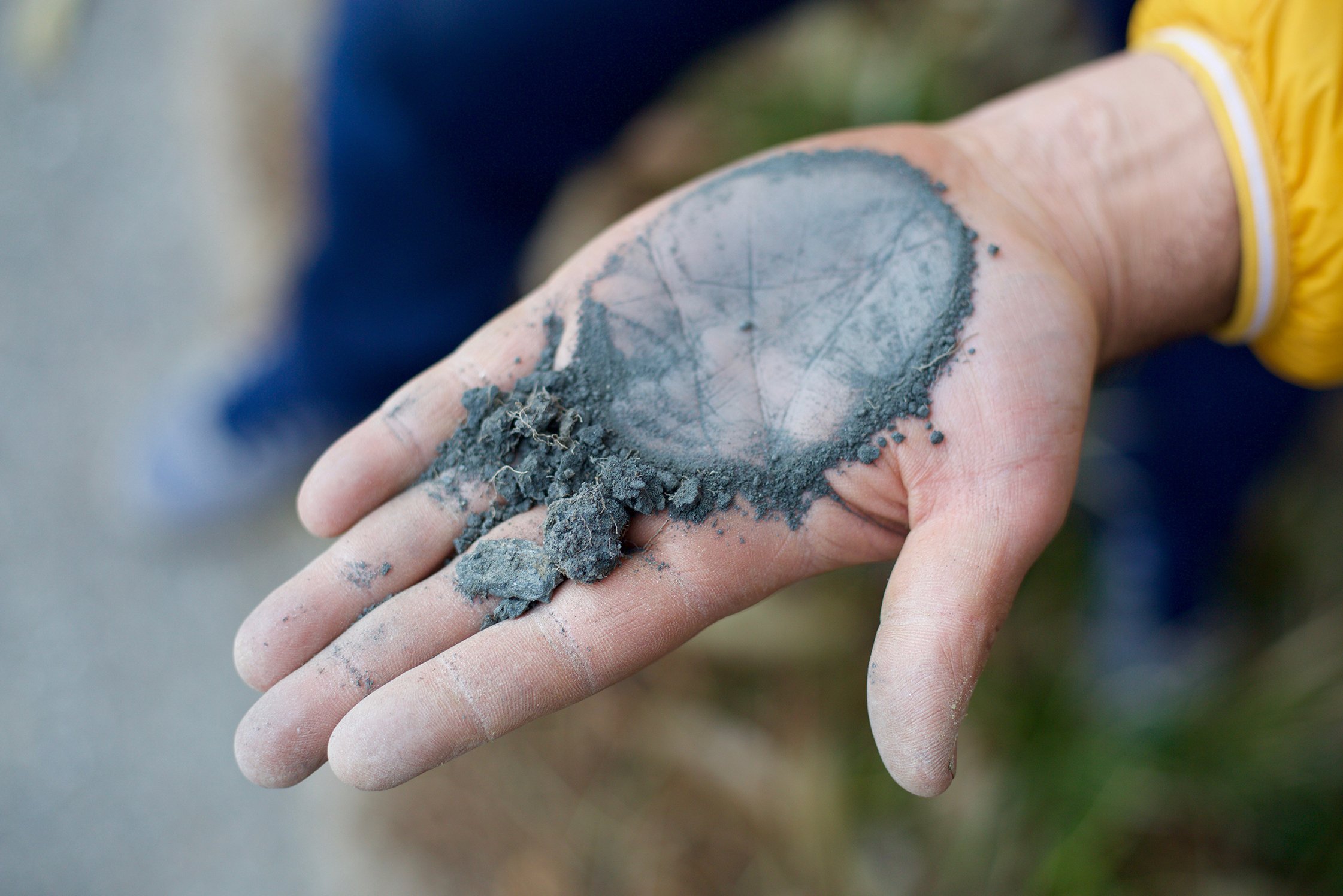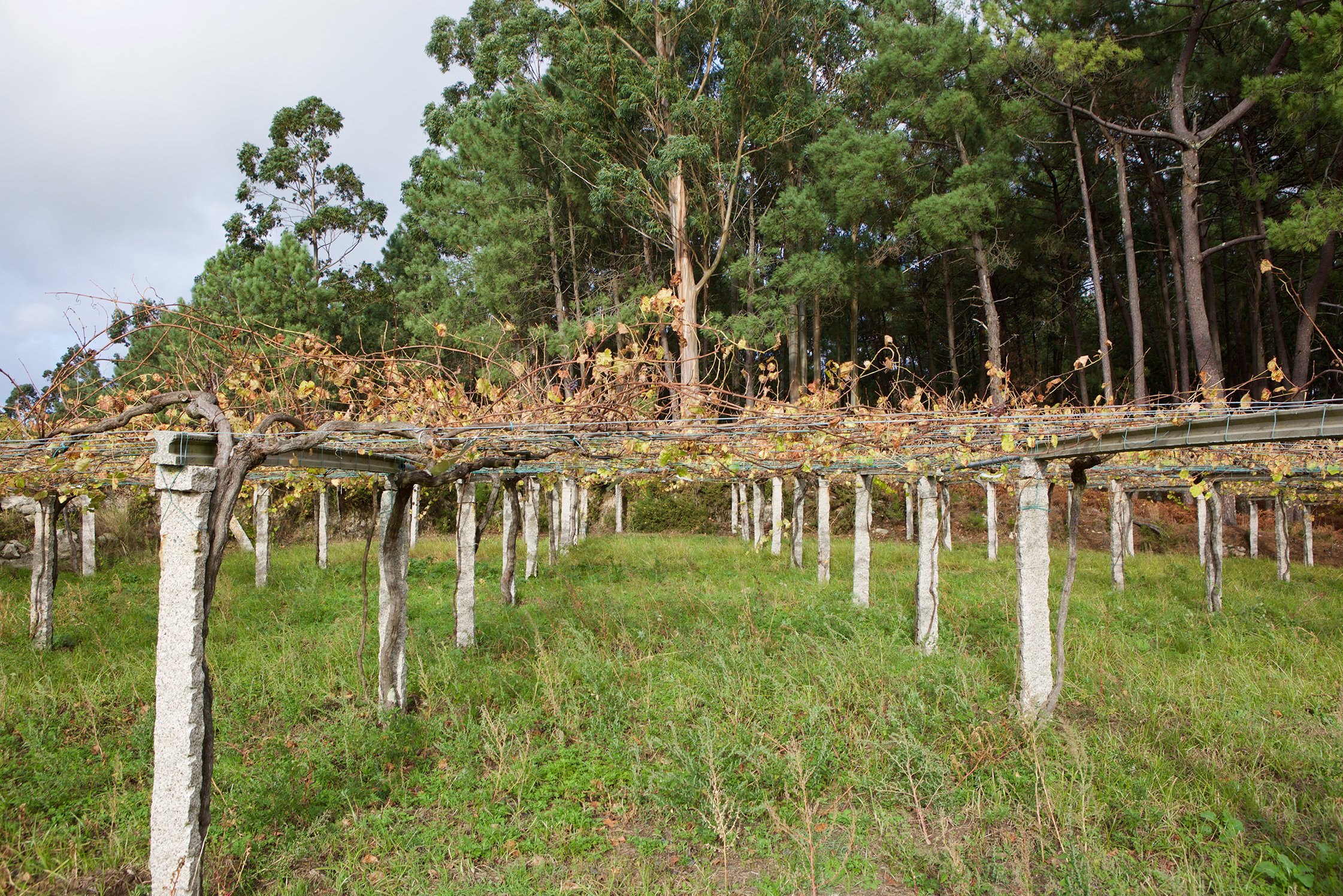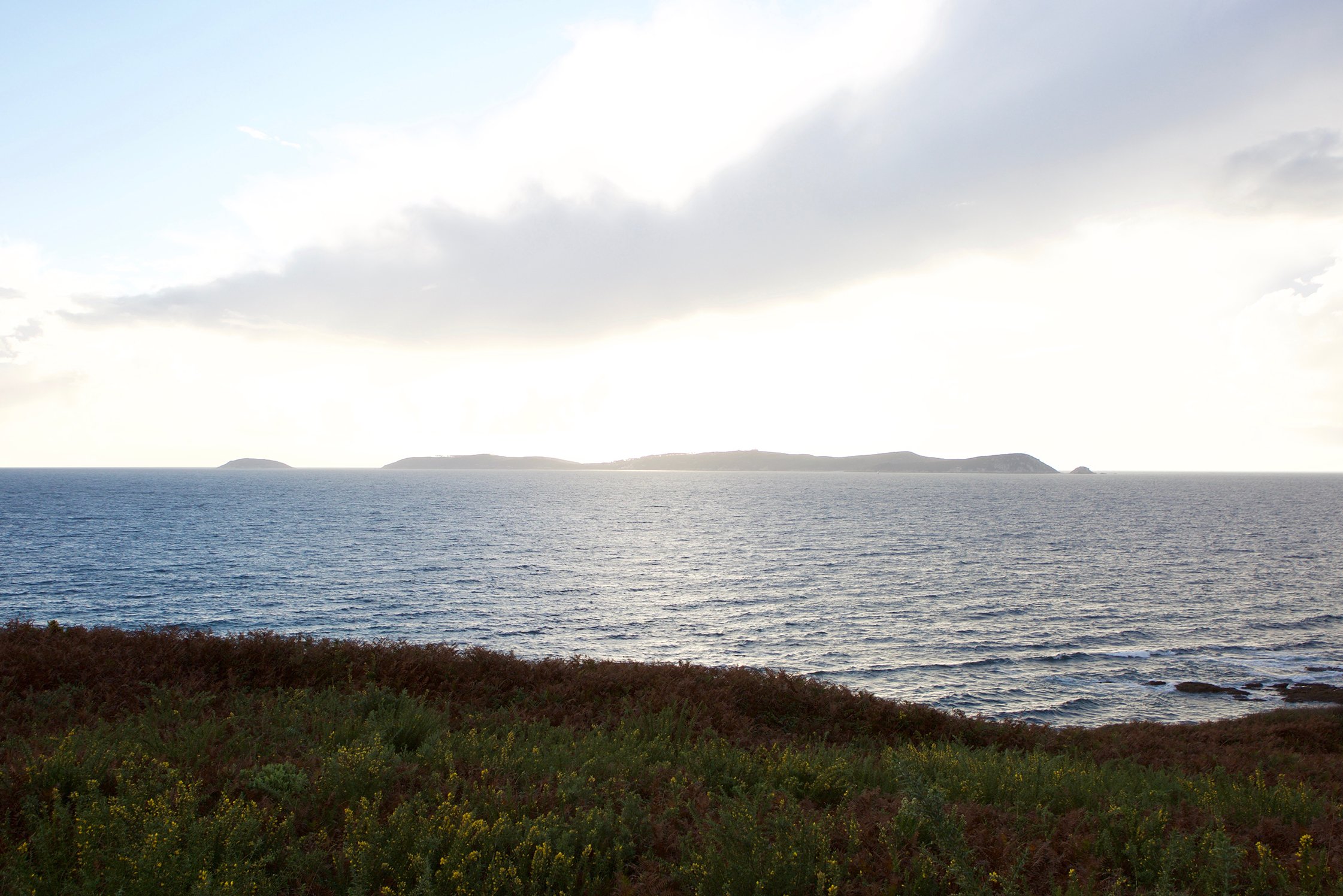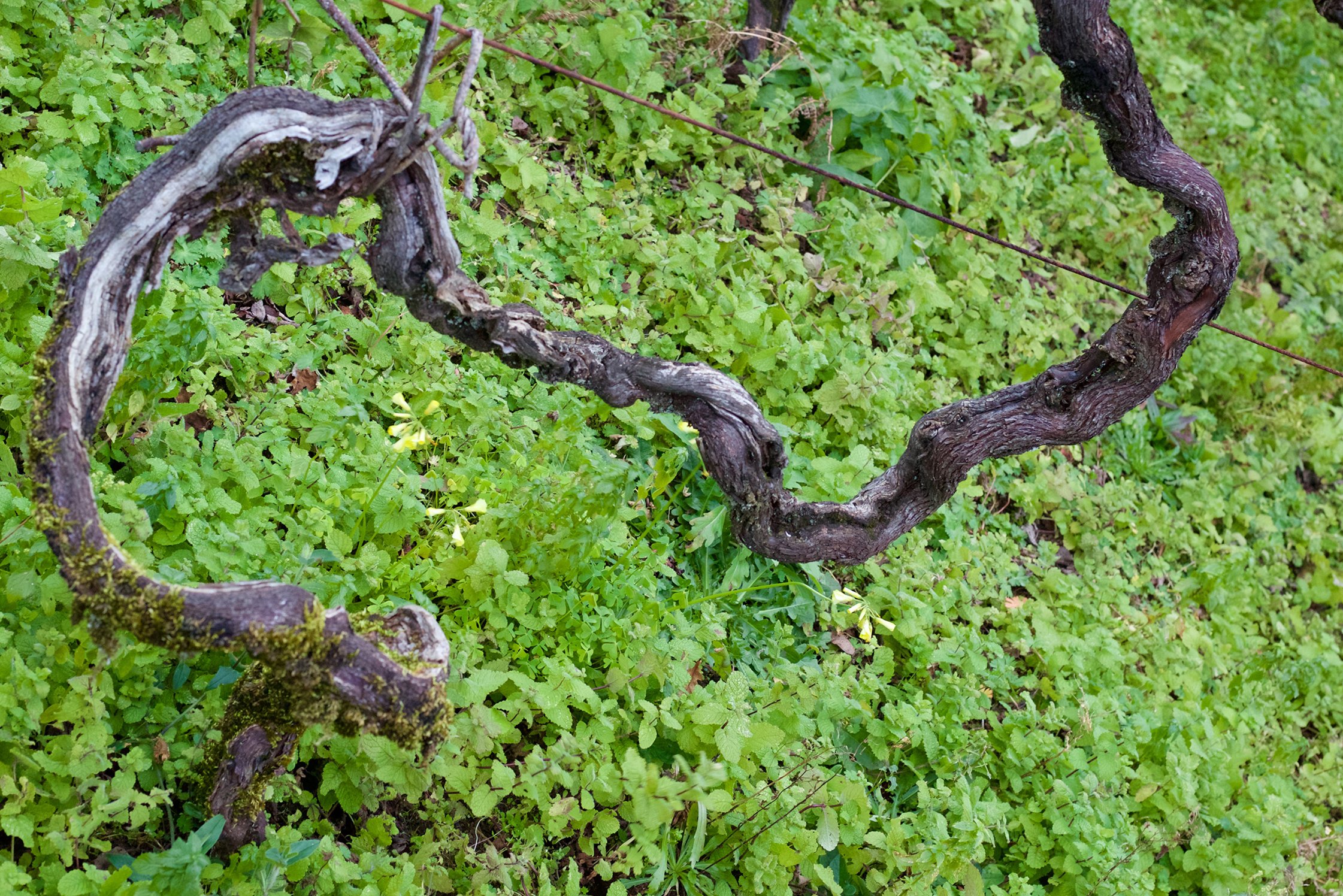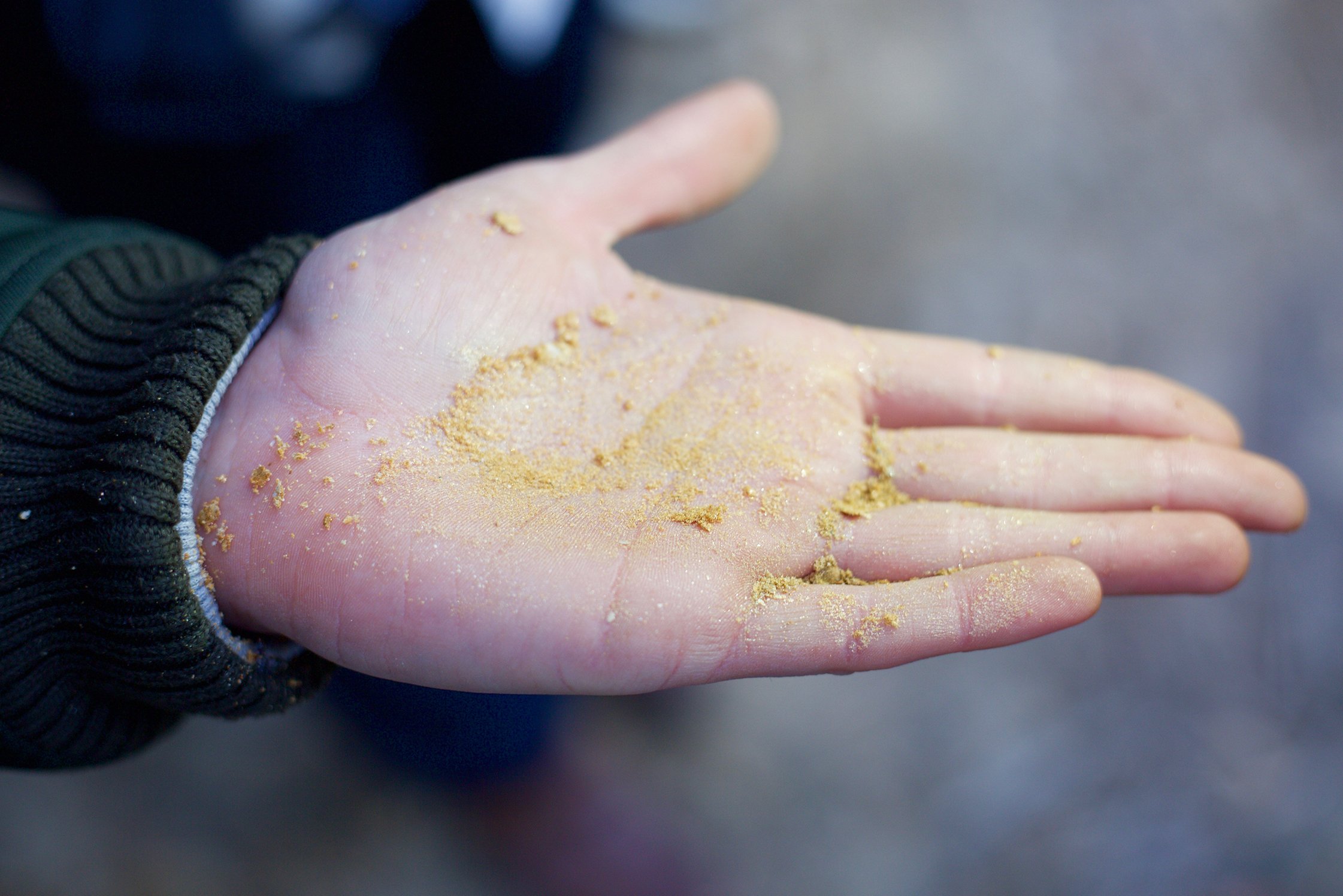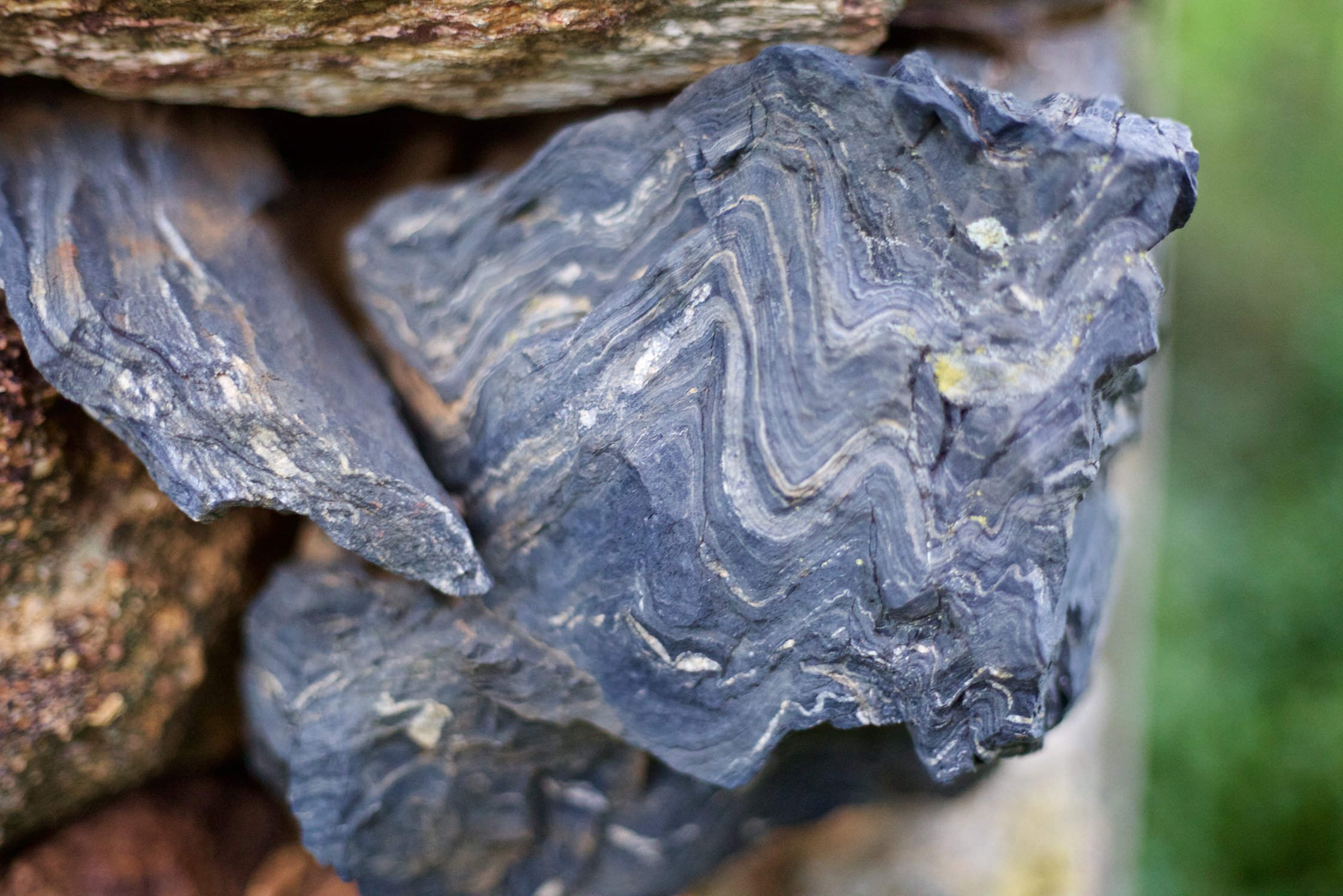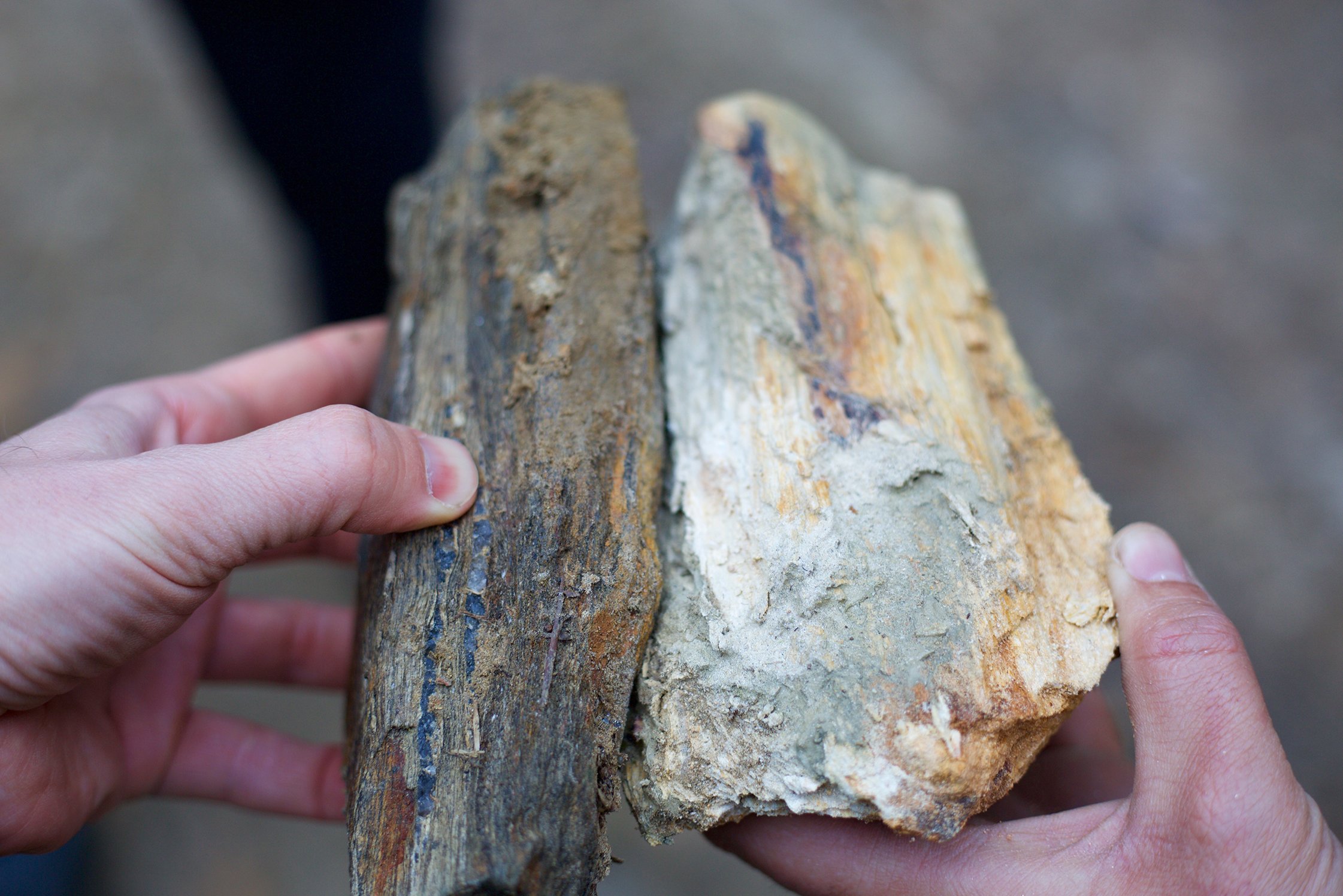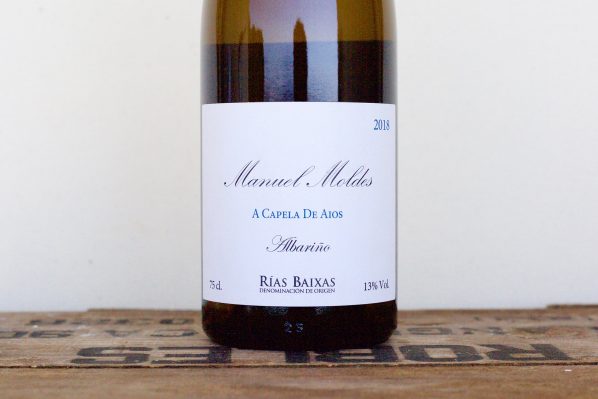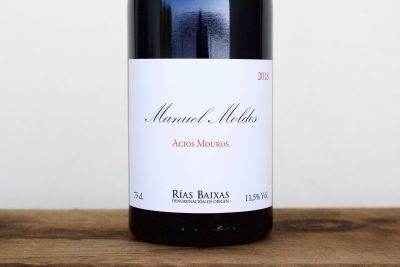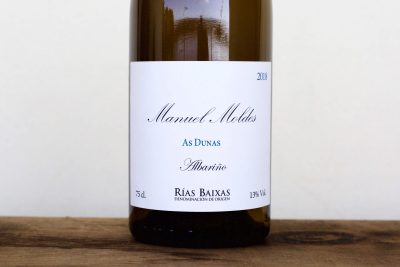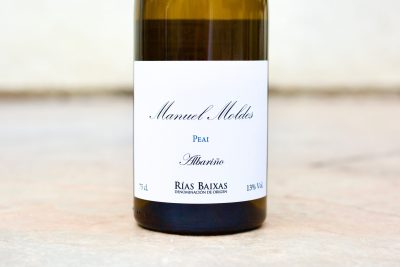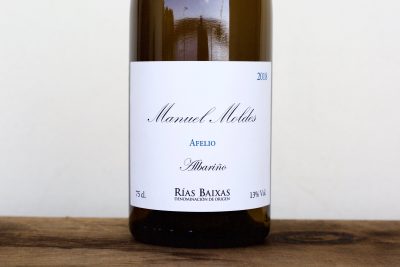Short Summary
One of Rías Baixas’ preeminent producers, Manuel Moldes crafts finely tuned, deeply technical wines. His Albariños highlight local schist and granite sites close to the Atlantic in the Rías Baixas subzone, Val do Salnés, to illuminate the differences between these rock types in the final products. The Albariños ferment and age in a combination of steel and old French oak barrels. The red winemaking follows the simplicity in the cellar of Albariños, though they involve the art of blending grape varieties from numerous terroirs. Reds often have some stem inclusion and are fermented and aged in a combination of steel and older oak barrels.
Full Length Story
During one of our many extraordinarily long vineyard tours, I asked Manuel Moldes who this we is that he keeps referring to since most of his narration was accompanied by this pronoun. “I don’t see anyone else when I visit your vineyards and cellar but you,” I explained. “Is there someone else we should meet that we haven’t yet?” His ever-present smile grows. A shrug of the shoulders. His loud laugh. “Para mí, el mundo del vino siempre ha sido familia” (For me, the world of wine has always been family.) And despite the appearance of a one-man show, his family and friends are, in fact, his anchor when the work is too great for him to do alone.
Chicho and the Rising Tide of the Rías Baixas
Manuel (his friends and family call him Chicho) is also an insider in a collective of inspired minds: a group of winegrowers, restaurant owners and sommeliers who converge on different meeting places throughout the Rías Baixas numerous times each month to drink, eat and share their ideas and experiences. The community of Rías Baixas has an easier connection to the outside world from tourism, access to the ocean and the larger cities compared to its neighboring Galician regions, great local restaurants that boast superb wine lists (with extremely fair prices) and nearly absurd quality of raw ingredients from both land and sea. All of these factors, combined with the open culture among its inhabitants have pushed it to the top of progressive Galician wine culture.
While only in his early forties, Manuel appears to be well on his way to Yoda status by age fifty, although his peers throughout the expansive underground Spanish wine scene think he’s already there. One of the brightest lights in the rising tide of the Rías Baixas, his inspired talent for wine feels innate. And though his aptitude for deeply technical wine analysis is finely tuned, it’s his curiosity and open mind that guide him.
Seeking Lost Treasure
He and his fellow galego winemakers in the Rías Baixas seek out unique vineyards to source grapes and discover something new. Because there are few large plots owned by individual proprietors, these discoveries often come from small parcels overlooked and underutilized; many are in the backyard of a home winemaker, or growers who sell their fraction of a hectare of grapes to larger negociants.
The countryside of the Rías Baixas, not yet subjected to the growth of suburban areas surrounding big towns, is typically composed of small farms of vines and other crops, around a central manor. This makes up most of the area where wines produced from purchased grapes are a blend of many parcels, with as many as twenty on granite bedrock and topsoil for the wine labeled as Afelio.
Albariño and the Return of the Reds
Rías Baixas’ geological heritage is as old as all of mainland Europe, but the wines it produces made an about face less than a century ago. Prior to the 1970s, this was red wine country, but today it’s known almost exclusively for Albariño. When in the right hands, Albariño can render forcefully elegant white wines of tension, laced with mineral nuances and complexity while maintaining reliable quaffability, and even in the most sternly acidic years pinned down by a cold and rainy summer. Of course, like with any wine region, there is the flip side, but even at its lowest level of mass production Albariño is hardly offensive—unless tragically sulfured into oblivion.
The red grapes are making a comeback. In this time in wine history there has never been a better moment to usher these wines of unique aromas, tastes and deep textures into the market. They’re extremely fresh with the shape and framing of a white wine. They often have as much acidity than some Albariños produced in the area.
Given the cold Atlantic climate, it’s almost impossible here to develop a wine of brute strength combined with extract and a fleshy body one could find in a warmer area. Here the granite soils (and to a much lesser degree, schist) lengthen the wines more vertically than round or horizontal in shape. Fruit in these wines often takes a seat further back than the first two rows dominated by extreme mineral and metal pressure.
It’s difficult to pinpoint what will emerge as the lead within the most compelling red grapes in the Rías Baixas; some of the current frontrunners are Espadeiro, Loureira Tinto, Brancellao and the extremely talented family of Caiños, of which there are six or seven known varieties—perhaps more will pop up someday with a family tree as extensive as this. Manuel’s Galician red blend is Espadeiro and Loureira Tinto with more than half with Caiño Redondo.
Winemaking Practice
Manuel’s approach to his Albariño range is to have wines with notable differentiating characteristics—in this case mostly influenced by the bedrock and topsoil and less in the cellar. They either contrast the soil type altogether, whether it be completely on schist, the A Capela de Aios, or those granite parcels bottled as Afelio. There are also the particularities within a rock and soil type to illuminate their differences and are compelling enough to be bottled alone, like As Dunas, from sandy schist soil with no bedrock and A Capela de Aios, grown on shallow schist topsoil with a soft schist bedrock.
Fermentation and aging takes place in a mixture of mostly old 500-to-700-liter French oak barrels. After nine to eleven months, they are bottled. The lengthy time in barrel, as opposed to the more regional norm of five to six months, allows some of the primary fruit qualities of the grape to peel away, making room for more of the unique individual nuances to more firmly declare themselves.
The simplicity of the red winemaking follows suit with the Albariños, but involves the art of blending different grape varieties from numerous terroirs in one wine. Each red variety carries specific qualities and when tasted separately are interesting, but the blends here work. Each grape variety is so specific and the cold climate and strongly influential topsoil and bedrock types further magnify their particularities. To blend them illustrates greater clarity of the terroir as a whole rather than the grape varieties.
Most who have not set foot in or read about Galicia would be in for a surprise. This is Green Spain, and it looks nothing like the iconic Spanish images of sweeping desert landscapes, endless olive groves and vineyards, and arid beaches of the Costa del Sol and Costa Brava with their inviting crystalline blue water. Here the hillsides are dense with forest and green everywhere, the climate is cold and wet, the beaches mostly frigid and windy with very little influence, if any, from the Mediterranean.
The Galegos are Different
The Galegos are a soft and humble people, innocent in a way compared to other parts of Spain, and have gotten the short end of the stick on what most of us think of as an endless supply of Spanish sunshine. They are paler in complexion, revealing their Celtic past, and their traditional dance outfits look every bit as Celtic as they do Spanish. Even the dances can be more of a jig filled with joy, smiles and stiffness; quite the opposite of the Spanish flamenco with its free-flowing movements and sensuality, its physical poetry of love and sorrow. Bagpipes, called gaita galleo, accompany the dance and endlessly echo through the granite corridors surrounding the Catedral de Santiago de Compostela, the final destination for pilgrims on the Camino de Santiago.
The Climate and its Influence
Like the culture, Galician wine is also different from most of the rest of Spain. Galician weather is influenced more by the Atlantic than the Mediterranean and the desert, and moving further west toward the coast, their influence is diminished. Manuel’s vineyards are located in the Val do Salnés, the coldest sub-zone of the Rías Baixas, Galicia’s coldest wine region. It’s one of the last frontiers of cold climate wines barely able to eek out ripeness in some years, although with climate change this comment may shortly be antiquated.
The result of the cooler climate’s influence on the wines in Galicia naturally keep the alcohol volume down, but these levels are also dictated by the grape varieties, viticultural practices, the soil composition, exposure, the picking decisions of the growers and, of course, the vintage—so many things to consider!
In the Rías Baixas and other Galician appellations there are many shared red grapes—some notables are from the Caiño family (mostly Caiño Longo and Caiño Tinto here), Brancellao and Espadeiro—but Albariño dominates something like more than 90% of all of the five sub-regions of the Rías Baixas.
Immediately visible upon entering Rías Baixas, the pergola vine training system was first employed about half a century ago when Albariño marched to its near clean sweep over the Rías Baixas, booting out most of the reds and other white grapes. Almost everything was replanted and with the new plantings came the question of how to better work against the humidity. The height of the pergola, which often stands between six and eight feet overhead, offered plenty of room for wind (lots of that here, thanks to the Atlantic) to work against the ever-present humidity.
Rías Baixas Subzones
Albariño is one the world’s most talented communicators of terroir, and it does so with striking clarity. The Val do Salnés is the epicenter of quality and it’s here where Albariño best demonstrates its breed, surpassing the other regions of the Rías Baixas. A brief summary of the others are, starting in the south and on the Portuguese border and Miño River, O Rosal, which is close to the ocean, like Salnés; Condado do Tea, further inland on the Miño and with a more dry climate making organic farming a reasonable possibility—but still not at all easy one; further north is the smallest, Soutomaior, at the eastern end of the Ria de Vigo, between the cities Vigo and Pontevedre; then the Val do Salnés (which will be thoroughly covered in detail below); and further north, the Ribera de Ulla, composed mostly of alluvium deposits from the Ulla River.
Albariño’s Promised Land: Val do Salnés
The Val do Salnés is mostly inside the Ría de Arousa, the largest of the rías, with some of it facing the Ría de Pontevedre with the O Grove peninsula in-between, connected to the mainland only by the O Vao isthmus (a thin strip of land).
Organic and biodynamic farming in the Val do Salnés is a challenge not yet surmounted with success with every vintage; the ideas are great in theory but not yet in practice. With June and July often between 80-85% humidity and temperatures between 22-25°C, it is a paradise for fungus. For organic or biodynamic methods to have a fighting chance, they need winters that get down to freezing and summers that hit over 30°C, and they have neither—yet… Furthermore, the negative ecological and carbon footprint from the excessive amount of copper and sulfur treatments and the fuel guzzled by machines to administer them is simply ecologically irresponsible in extremely high mildew pressure years. Let’s face it, copper is a biocide and it’s not good for the environment. Once we are gone, the legacy of copper left in soils from the wines we drank will remain.
Most of Salnés is deep inside an estuary (rías) and locked into the Atlantic climate. The extra dose of humidity from the estuary presents a very different set of circumstances compared to those further inland and out toward the west into the Ribeiro, where the Mediterranean heat ameliorates to a smaller degree high humidity problems. However, the Ribeiro, the next region over toward the west, is one of the most difficult areas for an unwavering commitment to organic and biodynamic viticulture as well—we know this firsthand working with growers there, like Cume do Avia and Augalevada, who can’t seem to get their organic production of grapes to beyond 50% of their potential yield—too much is lost to mildew every year.
Granite is king in the Val do Salnés with much of the topsoil decomposed sands derived from this bedrock. Despite granite’s affinity for good drainage, the ground in Salnés, with its west facing tilt, catches sun later in the morning and can still be completely wet in the early summer afternoon without having had a rain for weeks—something I have witnessed firsthand!
Apparently, no one yet in Salnés is able to successfully employ organics or biodynamics year in and year out (although some are steadfastly trying) without breaking away some years to avert complete disaster—usually resulting in some kind of systemic treatment (an application that is taken up through the roots of the plant and into the tissues, including the grapes). Indeed, the preference would be to have no systemic treatments at all, but that depends on the year.
The truest asset to this subzone are the progressive visionaries of the Rías Baixas who work together like a collective research science lab in search for ways to come closer to working their vineyards with organic and/or biodynamic practices. They work the best they can against disease, and if it weren’t for the resident alien fungi, downey and powdery mildew, from America that came in the 1800s, there wouldn’t be a need for copper and sulfur sprays in any European wine regions. To keep their history alive, Manuel and his cohorts work organically when possible, and make the exception when it’s a matter of losing too much of their crop.
Geologic Imprints
Geologically the Rías Baixas and all of Galicia are part of the Galician Massif, an ancient remnant from before Pangaea (the last supercontinent where all the main bodies of today’s continents were connected) began to break apart. Here the bedrock and soil is largely granitic, an acidic igneous rock, quite the opposite of limestone, a common alkaline soil throughout much of Europe and an exceptional bedrock for wine growing. And while there are scientific naysayers vis-à-vis the contribution of bedrock and soil to a wine’s characteristics (which they mostly limit to its water retentive capacity), the taste of wines from different formations say otherwise. We believe that—despite the lack of solid science yet to support it—bedrock and soil imparts characteristics to a wine that can be similar to another wine composed of completely different grapes but on the same general type of bedrock and soil halfway around the world.
The Galician Massif (a subsection of the Iberian Massif) is geologically related to France’s Massif Armoricain (home to the wine regions Muscadet and Anjou) and Massif Central (Beaujolais and Northern Rhône), most of Corsica and parts of Sardinia with all of its ancient igneous granite and metamorphic rock dating back as far as just over 500 million years ago.
It’s no surprise that similarities can be found between Albariño from the Rías Baixas and other noble grapes—like Vermentino from Corsica and Sardinia, Melon de Bourgogne from Muscadet, and Chenin Blanc from the Anjou—if grown in soils from the same geological era or makeup. When Galician reds are blind tasted by local growers with Beaujolais and Northern Rhône Valley Syrah in the mix grown in similar soil types as their region, they’re easy to confuse one for the other. The impression is uniquely similar in mineral, metal and salty characteristics in both the aromas and palate. The difference is often the solar power and the grapes, along from the influence of the grower in the vineyard and cellar. Disparities aside, the similarities are notable for those who make it a habit to observe such things.
Moldes’ Vineyards
Manuel’s vineyards are on granite and schist bedrock, with topsoils of the decomposed bedrock with varying grain sizes, from talc-like fine sands to loamy mixtures of clay and sand (the sandy elements called Xabre—pronounced Sha-bray). The granite bedrock is old and extremely friable and, like the schist bedrock sites, is crushable in one’s hand—at least from what’s found on the surface.
The areas where Manuel works in Salnés are the Ayutamiento de Meaño, about halfway between Cambados and Sanxenxo (pronounced somewhat like San-shen-sho). In Meaño it’s all granite with cold temperatures, less wind and higher humidity. His other vineyards are close to Sanxenxo, in the hamlet, Aios. Here is where Chicho has focused the majority of his search for vineyards. The soil is schist, a rarity in the region, and full of metals; certain places on this hill were mined for tin (called estaño) and tungsten, the latter is an extremely strong metal used in steel to bring strength, and also used for light bulb filaments because it has the highest melting point of any metal—an interesting factoid…
Aios is located outside of the Rías de Arousa and higher up on the hillsides than those in the valley. It’s fully exposed to ocean winds which makes it even colder by a couple of degrees Celsius than the central Val do Salnés, but with less humidity and more wind—it’s even harder to get them fully ripe here than in the valley below. Sadly, there are few vineyards left in this area and Manuel believes it to be possibly the most promising area in the region. But with the spectacular views of the ocean and estuaries, it’s no surprise that vineyards have been replaced by homes.
**Manuel’s red wines and their specifics are covered in each wine description.


